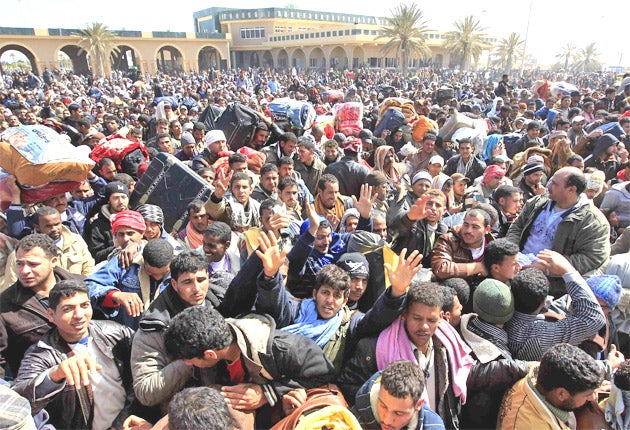Robert Fisk: Panic on borders as chaos engulfs Libya
Tens of thousands flee mounting violence as UN warns of urgent humanitarian crisis


The Libyans watched from an open window of the immigration post, leaning out to see the 20,000 fleeing Egyptian, Bangladeshi, Chinese and Iranian workers heaped up against the border wall. They seemed quite unconcerned, shirt-sleeves rolled up, moving to a window closer to this crowd. Already up to 75,000 have struggled into Tunisia, but yesterday the crossing system collapsed as thousands of men, almost all Arabs desperate to escape Muammar Gaddafi's state, fought with local Tunisians who – under the eyes of the army – attacked them with stakes and iron bars.
Many of the soldiers hurled plastic water bottles and biscuits into the masses of refugees who began to jump the border wall in their desperation, heaving family members and baggage through breaks in the cement. Clichés run out when faced with such chaos and unnecessary suffering. "Insupportable" was the word that came to mind yesterday. Most of these 20,000 had gone without food, water or sleep for four days. How is it possible that people should suffer so greatly at a mere border post?
Officials turned up with anodyne words of fearful irrelevance. Josette Sheeran, who rejoices in the title of executive director of the World Food Programme, stared at this ocean of humanity and announced: "We are doing all we can – we are working through this situation. And it's never too late." But it was. Ms Sheeran arrived with 80 tonnes of food, most of it high-energy biscuits, which were thrown over the wall at the crowds once she had left.
More to the point, Firas Kayal, of the UNHCR, took one look at the young Tunisians beating the Egyptian refugees, said that a crisis had been reached at the border and that 14,000 refugees had crossed in the past 12 hours alone. "The Tunisians' capacity to help has reached its limit," he said. "We are bringing in two UN flights today filled with tents for these people inside Tunisia. We are helping the local authorities and the local people to cope."
What Mr Kayal did not say, of course, was that the men beating the refugees were the "local people".
All day it went on, as the men squeezed against the gate, animal roars breaking out among the thousands behind them. Unconscious men were carried over the frontier wall and laid side-by-side in the sand and on the tarmac by Tunisian doctors.
They were brought round with water and by nurses who massaged them. Many simply sat on the road, shaking their heads and weeping. By dusk, the Tunisian army had climbed the gate – literally advancing several yards into Libya – to drag barbed wire along the wall. The Tunisian authorities had by nightfall turned the nearest camp into a refugee city although they were not without some cynicism. "When Tunisians arrive in boats in southern Europe, you call it a crisis," a doctor told me sharply. "But when tens of thousands of Egyptians try to cross our border from Libya you give them biscuits and forget us."
Of all the gloomy stories yesterday, however, none was as grim as that of Adel Jumaa. He was a young Libyan who had just escaped across the southern Tunisian border and spoke of Libyan special forces checkpoints, of senior police officers shot by the regime, of the people of western Libya who wanted to get rid of Colonel Gaddafi but who were unarmed and too fearful to leave their homes. Libyans who had spoken to foreign television stations by telephone had been arrested and "disappeared".
He said: "There is a big bridge this side of Tripoli and Gaddafi has put dozens of missiles on the eastern end. The security people checked my car up to 15 times at road blocks. They were looking for telephone smart cards, PIN cards, anything to do with communications."
This surreal awfulness was all too well illustrated for me when, driving back from the border last night, I listened to Colonel Gaddafi's state radio broadcasting the 5pm news from Tripoli. Here, for students of the absurd, were the contents. President Barack Obama has announced that al-Qa'ida controls Benghazi. The "people of Libya" have denounced UN sanctions. A South African "King" has telephoned Colonel Gaddafi. Revolutionary Committees will protect the people from terrorists of a "well-known group". An independent Libyan committee has been set up to inquire into recent "disturbances" and to find out why foreign news organisations were lying about Libya. The Libyan people "are happy to defend their revolution and their historic leadership and the achievements of their beloved leader". In Benghazi, "the people who did 9/11 are slaughtering and raping". Oh yes, and an imam denounced all other imams who criticised the beloved leader and all foreign news organisations which denounced the same Great Leader. And then, on a telephone line, a "reporter in Benghazi" described al-Qa'ida's cruelty towards the people of Libya.
Join our commenting forum
Join thought-provoking conversations, follow other Independent readers and see their replies
0Comments